Pro-russian edgelord worried about the mysterious “escalation” (via Ilia Ponomarenko twitter)
In Russian popular culture one of the most popular characters is one Ostap Bender, a con man extraordinaire, created by Ilya Ilf and Yevgeny Petrov. He always finds and easy way to earn money, but somehow is never able to hold on to it.
In one scene he introduces himself as a chess grandmaster to a group of naïve small town amateur players - and invites them to a simultaneous tournament (for a small fee). Of course, he barely knows the basic rules, so he begins to lose all the simultaneous games very quickly.
Being the con man - he keeps a straight face while losing pawns and figures. The local players are unable to stand the pressure. They suspect the grandmaster is luring them into some horrible trap, they prefer to give up already rather than escalate the game.
However, there comes the inevitable moment. “Check and mate… I gave you check and mate, comrade grandmaster!” - whispers one player in astonishment. Ostap Bender realizes this is the moment to take the money and run - and off he goes!
Andrey Mironov as “the canon” Ostap Bender in Russian cinema (1976)
I can’t help but think of this scene when I read western analysts worrying about the “escalation” of the war in Ukraine. Or fantasizing about the phantom Russian army of 700 thousand soldiers waiting to engage (“they haven’t started yet”!). Or warning that recent development will be a “gloves off” moment for Russia and they will “retaliate”.
In the first days of the invasion Russia lost their elite paratrooper units during the failed attempt to capture Kyiv;, they lost their elite spetsnaz unit during the failed attempt to capture Kharkiv; they lost their only Black Sea cruiser the failed attempt to establish naval domination; they lost their best trained pilots during the failed attempt to establish air superiority - and yet some people in the West believe this is all going according to some “master plan”, the brilliant 5D chess stratagem played by Comrade Grandmaster Putin.
Soloviev and his guest, worried that we are not afraid of their blackmail. “Do they even read Dmitry Medvedev”? We do, comrade. For the laughs (via TheKremlinYap)
I emphasize “some people in the West”, because this is no longer the case in Russia. I watch Russian TV shows hosted by Soloviev, Skabayeva, Mardan and Norkin. I read Russian Telegram channels. Yes, officially they still claim to believe in victory, but they no longer believe in any of the above. They keep repeating “we have to win”, but they don’t know how and they keep asking each other for ideas.
The recent raids by the Russian separatists in the Belgorod People’s Republic caused genuine panic in Russian media. “What can we do to prevent it?” - they asked their usual experts (retired or active military commanders).
“Nothing, really” - responded Alexander Khodakovsky, commander of the Vostok battalion stationed near Vuhledar (in January they were supposed to take Vulhedar in 24 hours - at least according to the pro-Russian Western “analysts”). “The only viable solution is to form a continuous front line and we don’t have enough resources for that”.
“So what can we do to reassure the people who live near the border?” - asked Skabayeva in astonishment. “My purpose here is not to say something reassuring, it is to outline the problem” - he responded. Some experts suggested the necessity to form “territorial defense” units - the fact that Russia never had them is a proof they never really felt “threatened” by NATO or Ukraine - but there’s not enough resources even for that.
The look on Skayabeva’s face is worth thousand roubles! (or, as we say in Europe, ten euro) - via TheKremlinYap
If anyone who still believes in Russian power is reading this: then I’m begging you to answer this for me. If they don’t have enough manpower, arms and ammunition to protect their own border - how could they still have a “hidden army” capable to re-take Kherson, let alone conquer Odessa and Kyiv?
If you are afraid of “escalation”, what do you mean in reality? That Russia will invade Ukraine again? Invade it some more?
If you believe that Russia will take the “gloves off” (or already did so, as apparently someone claims in this deranged tweet), what does it mean exactly? That they will do something more cruel than before?
The last time Russian propagandists (I mean: Russian-Russian, not “American cosplaying Russian”, Donbas Devushka style) have had any hope was last autumn. They hoped to destroy Ukrainian “critical infrastructure”, so Ukrainians will freeze and starve in the darkness, the trains will stop running so the army cannot get supplies, and as a result they will force Zelensky to surrender or topple him.
September 2022: Margarita Simonyan has high hopes about the “destruction of critical infrastructure”. She must cherish those memories! (via nitter.net)
This never happened. Yes, the autumn and winter missile and drone Russian attacks caused a lot of damage and suffering, but they were never even close to the destruction of critical infrastructure. Ukraine repaired the damage in real time and was quickly back to exporting energy. There were some blackouts, true, but in a Russian town in glubinka you have blackouts even without a war - in Chelyabinsk they call it “Tuesday”.
Now the topic of “destroying Ukrainian infrastructure” is all but forgotten. As if it there was never such attempt, much like there was no attempt to capture Kyiv.
However, some people fantasized that after the Ukrainian blow to the Kremlin - symbolic but spectacular - they “crossed the red line”, so Russia will respond destroying the “decision making centers” and killing Zelensky. For a while the Russian propaganda was full of comments like in the tweet below: that Zelensky is cowardly touring the world afraid to come back to Kyiv due to the imminent Russian retaliation, while Putin is bravely hiding in his bunker.
Apparently, Russia will not take “the gloves off”, because they already did so “after the drone attack on Kremlin”. So there is no neet to worry about escalation. What they gonna do, take the gloves off a little more? (via Nitter.net)
How can one still believe that Russia has capabilities to destroy “critical infrastructure”, “decision making centres” or “bridges over the Dnipro” (“why the bridges over the Dnipro are still standing?” is a question frequently asked also among Russian-Russians, but they can’t find any answer better than “after 15 months, we still haven’t started yet”)?
My answer is: Russian missiles and Iranian drones are not suitable for this. Best they can do is kill random civilians - if you launch 50 drones towards a 2-million city, most of them will be shot down mid-air, but two or three will explode in a populated area, presumably killing an elderly woman and her dog she took for a walk. It’s a war crime, but it does not change the course of the war.
To destroy a bridge, a tunnel, a “decision making center” (etc.), you need precise guidance. Russian military technology sucks at that.
The Ukrainians that I’m in touch witch are no longer afraid of any “escalation”. When they hear Russians speaking about “retaliation for crossing red lines”, they respond with “bring it on”. They don’t feel it can actually get any worse for them.
When we in the West talk about “escalation”, it usually means that we are afraid of Russian nukes. Let me explain you why I’m not afraid even if Russian propagandists frequently talk about nuking my country, too.
Would Lavrov nuke his own stepdaughter? (via AP and Instagram of Polina Kovaleva)
First - to quote Sting, “I hope Russians love their children”. Russian leaders gave their mistresses and their (step)children the best gift for any Russian - apartments in London, Italian villas, Manhattan penthouses, yachts in the Mediterranean, scholarships for American universities etc.
The golden children of Kremlin, mistresses and children of Putin, Peskov, Lavrov, Solovyev (etc.) reside in the West. Circumventing the sanctions, they still do. Russia will NOT nuke London or New York as long as Russian elites are there.
This is a fairly new situation. During World War 2, children of Goering or Himmler did not study in Harvard or shop at Harrods. During the cold war, mistresses of Stalin or Brezhnev did not brag in photo-stories about their vacation in Cote d’Azur. Russian elites - to their own peril - integrated themselves too closely with the world of Western luxury. They just cannot live without their Guccis, can they?
So even if some day Putin decides to arm the warheads, the Kremlin elites will tip their mistresses that it is no longer safe to be in the West. The first warning will be a sudden rush of heavily botoxed women sporting grotesquely inflated lips, carrying their Louis Vuittons through the airport, desperate to get to their sugar daddy’s cozy bunker in the Urals.
Until we see that - I refuse to consider the Russian nuclear blackmail as anything more than empty yapping. They won’t nuke their own kind.
But even if we suddenly really discover there are no Russian elites anymore in the West, I still don’t believe in the Russian nuclear threat. Here is my reasoning.
First: the West made it pretty clear we will not allow even a “tactical strike”. Nuke on Ukrainian target triggers full NATO response.
As demonstrated, Russia is not capable of defending their own borders. In case of an open, full scale Russia-NATO conflict, NATO armies enter mainland Russia without much resistance. Instead “Kyiv in 3 days”, we will have “Krolewiec in 3 hours”.
Due to design mistakes from half a century ago, Russian airplanes are unable to engage Western airplanes. The last time it was an equal areial warfare was in the 1960’s, the decade of Vietnam war, psychodelia, beatlemania and Mig-17.
Since then, we have had some air combat between Western planes and Soviet planes (in Middle East, mostly), and literally not a single case where Soviet planes or Soviet AA batteries scored any success. On paper, Mig-29 or Su-27 can have better parameters than their Western counterparts, but in reality what counts is aviation electronics.
Soviet designers fetishized dogfight while the West bet on long-range engagement. As a result, a hypothetical F-16 vs Su-27 combat would look like the scene from “Raiders of the Lost Ark”, when Indiana Jones encounters a skilled swordsman. All his skills amount to nothing when Indy simply shoots his gun.
Mig-29 versus F-16 duel - from “Raiders Of The Lost Ark”
If you disagree with me here, I will gladly listen to your refutation. My expectation for the “full scale NATO-Russia war” is that on the very first day, NATO would establish absolute air superiority over mainland Russia, destroying most Russian aircraft before they even get airborne. And then - bombing any target at their will, just as it happened in all the previous “NATO-anyone” conflicts.
“Russian nukes” will be obliterated by conventional weapons before they are armed, let alone launched. Russian submarines are tracked by NATO satellites in real time and I don’t think they will have a high survival rate. In fact, I expect this rate to be 0% after the first hour of a “full scale war”.
Of course this is merely an armchair analysis (although I’m referring here what I read elsewhere). If someone says “it’s better to avoid the risk”, I agree with them.
However, bowing down to blackmail is not a good long-term strategy for avoiding the risk. You basically guarantee to yourself that this blackmail will happen again in near future - usually the next version will be even worse.
If the West now bows down to the blackmail of “give us Ukraine or we nuke you”, we will soon hear “give us Finland or we nuke you”, “give us Taiwan or we nuke you” etc.
Where will it stop? “Give us Alaska or we nuke you?”. Each time you agree with the blackmailer demands, it becomes harder to shake down another blackmailer. I am fully with you if you say “let’s avoid the risk”, but I wholeheartedly believe that surrender to blackmail is actually increasing the risk in the long term.
People in Kyiv are not afraid of Putin’s “escalation”. People in Warsaw are not afraid of Putin’s “escalation”. Why the people who worry about it live mostly in New York or London, next door to Polina Oligarkhova and Ivan Kleptokratov?





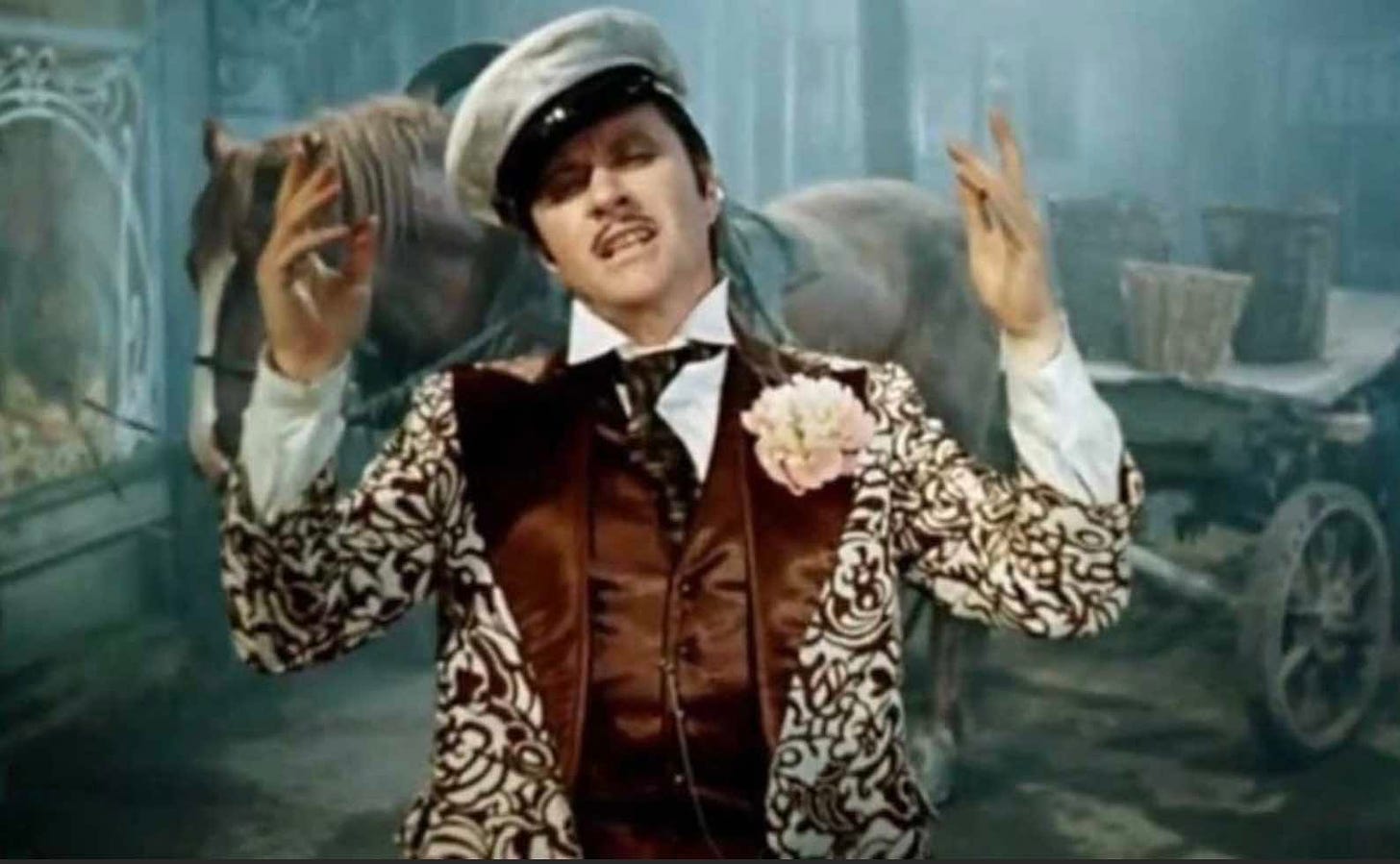
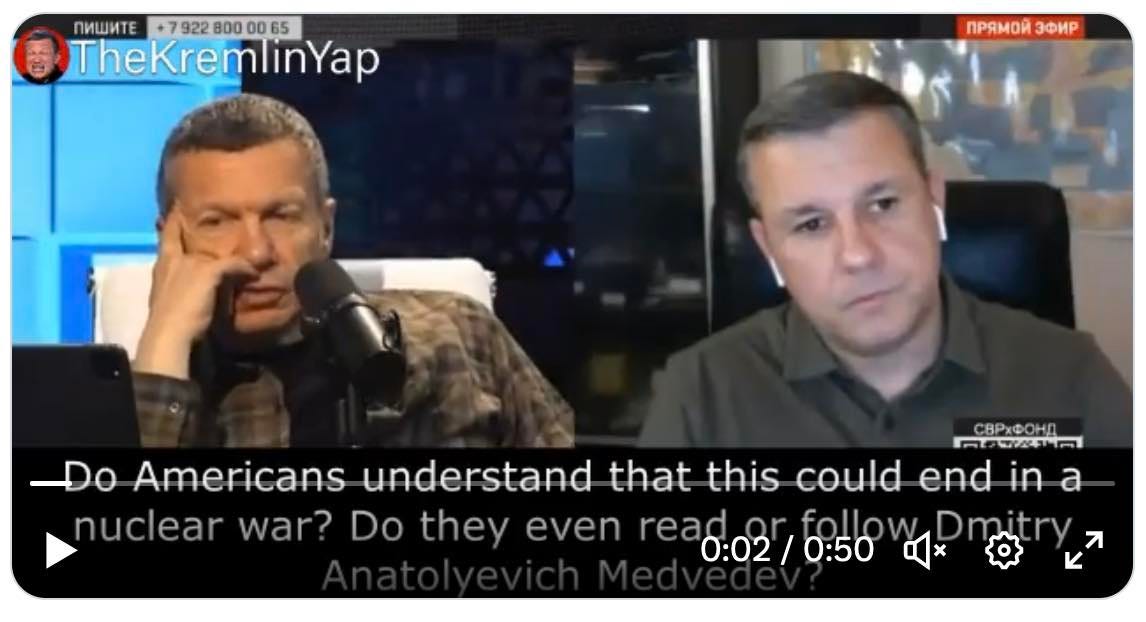
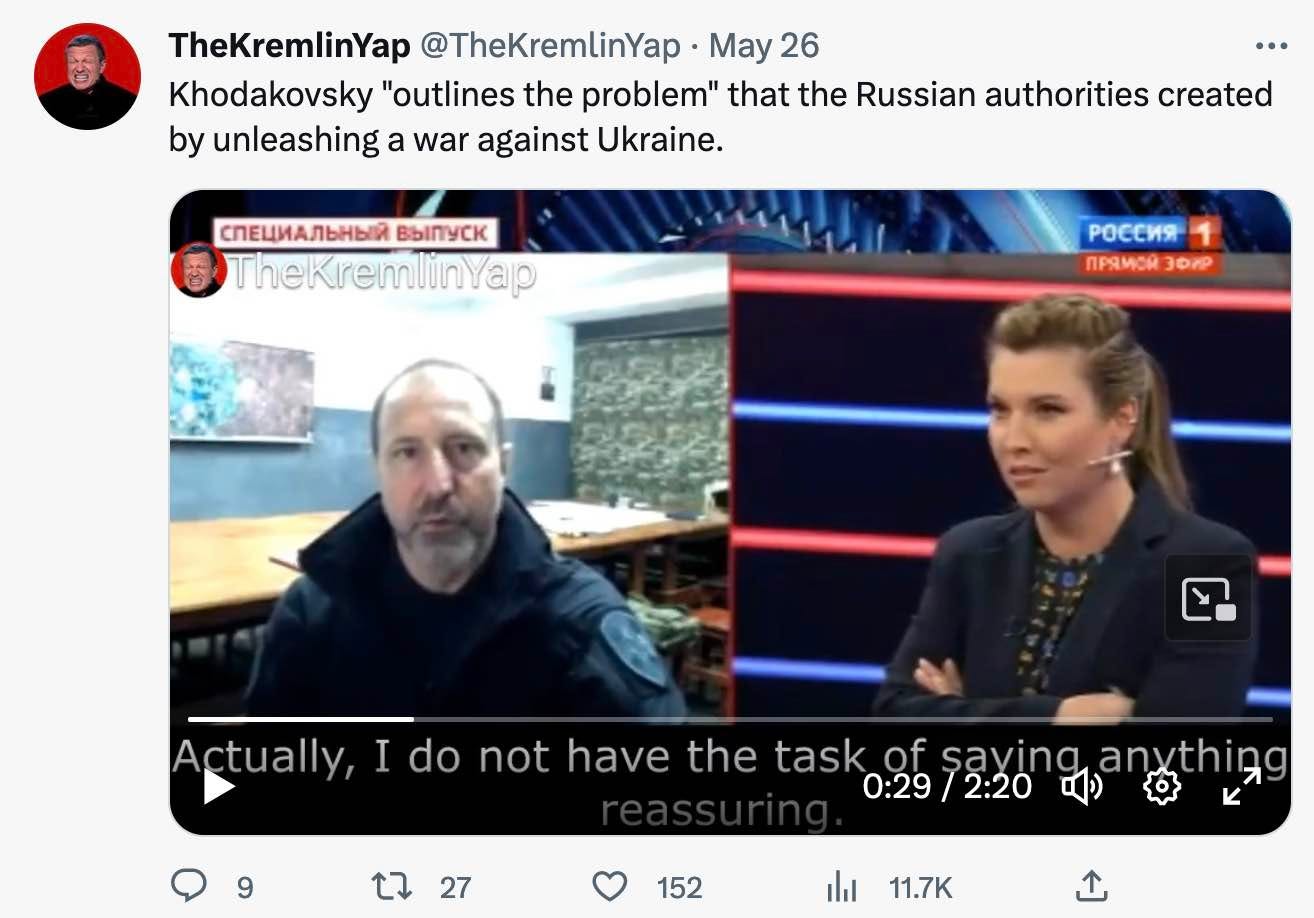
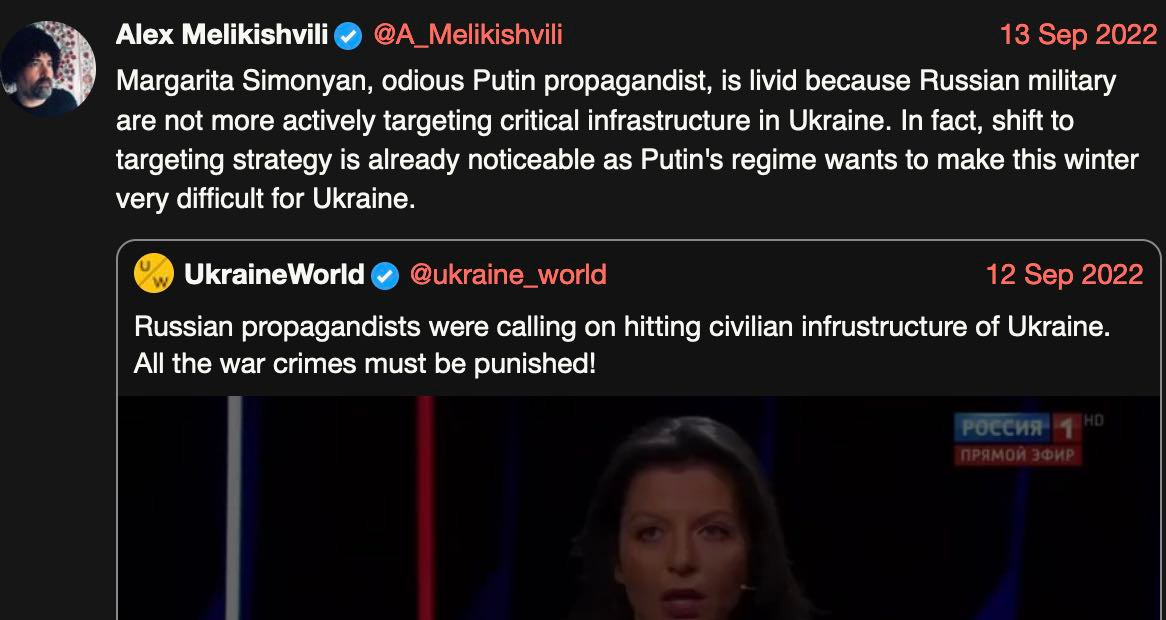


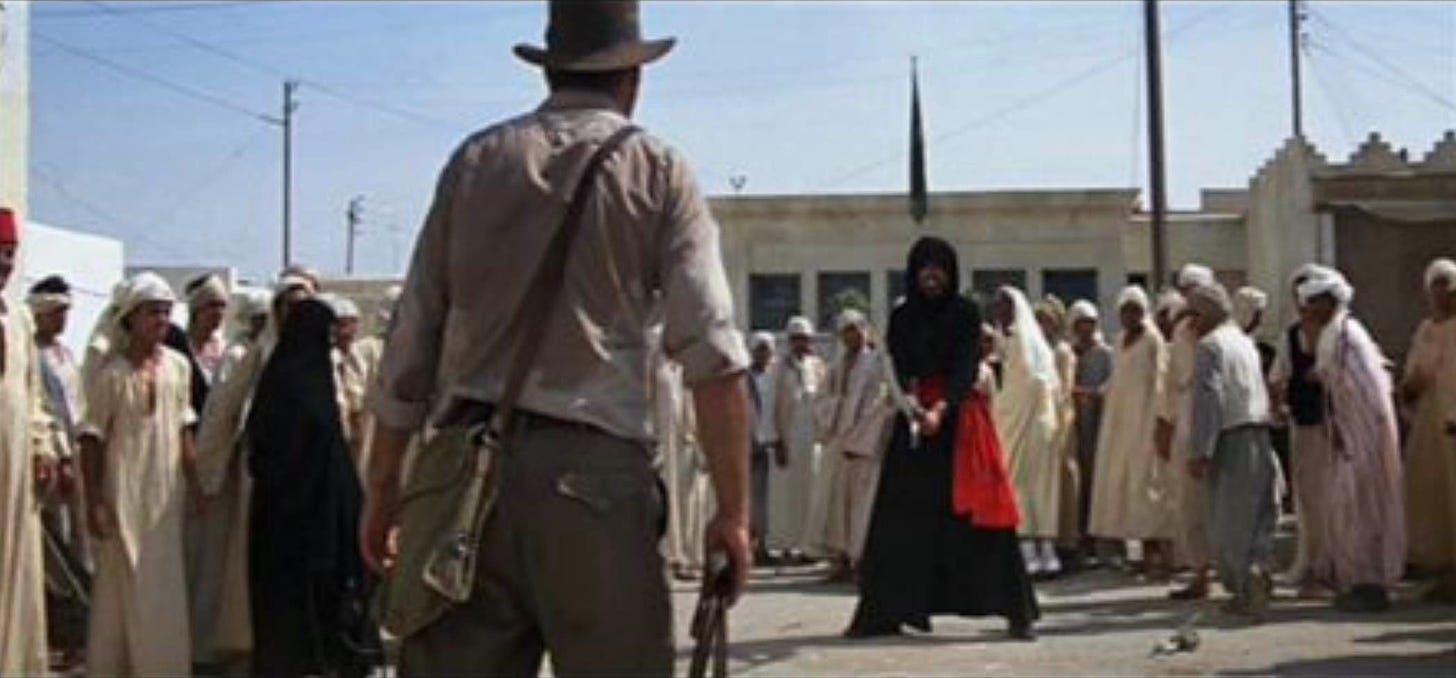
I think the blackmail risk works two-ways. That is, the more time they try to blackmail the West and it doesn't work, the less effective the blackmail becomes. They have overplayed this hand a lot, it was actually doing something at the beginning of the war, but now every time they do it, they make it more likely US will step through yet another border, because it becomes clear how meaningless the threat is.
Russia managed to complete a lot of achievements in this war. Lost lives of their soldiers, ruined economy, ruined, unrecoverable economic ties with the West, ruined resources export, ruined diplomatic relations, ruined position of RU-friendly agents (regardless if paid or just uninformed) in western societies, ruined image of a great, powerful empire. All gone, not coming back, and for nothing. And each point on that list was a real, big strength Russia had before the war.
I'm afraid that the answer is that people who are afraid of the escalation simply don't feel that this their war, or a war that the US/UK/France/Germany should in any way be involved in.
To them I think the Ukrainians and Russians are generally the same (as are all Eastern Europeans generally), corrupt thieving kleptocrats by and large whose fate really has no impact on the Western world, hence why get involved, let them thrash it out between themselves, the Western world has its own problems to worry about.
The notion that letting a dictator like Putin grow in power is somehow a danger to global security also seems distant and elusive, after all, the US has done business in the past with many such dictators, the world did not end as a result.
I guess maybe poisoning people on UK territory probably crossed a line, making it slightly "their" conflict as well, but not to the point of actually risking any more than absolutely necessary. Putin has generally been careful about not directly treading on Western interests (quite the opposite actually), which was part of a conscious strategy of delineating spheres of influence between the East and West in Europe.